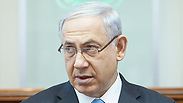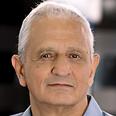
Prime Minister Netanyahu. Saves Abbas and PA from death on a daily basis
Photo: Emil Salman
There are a few things that should be said in praise of Prime Minister Benjamin Netanyahu.
If speeches could kill, Abbas and his PA would have been dead a long time ago. Fortunately for them, and perhaps fortunately for us too, there is someone who saves them from death on a daily basis. His name is Benjamin Netanyahu.
Netanyahu devotes a large part of his daily performances to Palestinian Authority Chairman Mahmoud Abbas. In Hebrew and in English, sitting at the cabinet table or during a visit to a sports facility, he beats him vigorously.
Abbas, Netanyahu clarifies, is a peace refuser; Abbas has chosen terror; Abbas only knows how to say no, to any offer, Israeli or American; Abbas condemns the past Holocaust but welcomes the future holocaust; Abbas poisons the souls of Palestine's children. On the list of the State of Israel's enemies, he is in the first line, alongside Hamas and Iran.
Peace Options
Sever Plocker
Op-ed: It's about time that Israel's political left woke up and started thinking seriously about other alternatives to 'two states for two people.'
When the Israeli government was required to respond to Abbas' decision to renew talks with Hamas in Gaza and establish a Palestinian unity government, Abbas and the entire Palestinian Authority were placed in the pillory.
And then the cabinet convened to decide on Israel's punitive measures. Some spoke about economic sanctions: The tax money the Israeli customs collect would not be transferred, and the funds which will pile up in banks in the West Bank would not be converted. Some suggested halting the security cooperation, and some suggested a proper Zionist response in addition: New construction plans in the settlements and annexation of lands.
All that noise resulted in nothing, apart from newspaper headlines. Tzipi Livni managed to restrain the cabinet decision. Instead of sanctions halting the transfer of funds, sanctions limiting the transfer. The IDF took care of the rest. The coordinator of the government's activities in the territories, Major-General Yoav Mordechai, went to Bank of Israel Governor Karnit Flug and convinced her to interpret the cabinet's decision leniently.
Finance Minister Yair Lapid took care of his side. The funds collected by the customs from PA-bound imported products – about NIS 600 million ($170 million) a month – are still being transferred quietly to Ramallah from Israel, with a partial deduction for the payment of debts to the Israeli health system and Electric Corporation. The banks in the West Bank are still covering shekels in the Bank of Israel. A transfer of an additional NIS 200 million ($57 million) was approved last week.
Had these steps not been taken, the West Bank's banks would have collapsed, dragging most of the economic system with them. As for the PA, without the customs funds, it would have avoided paying salaries. Its systems would have fallen apart, and Israel would have had to choose between anarchy on its doorstep and reoccupying the West Bank cities.
The less dangerous option
Netanyahu, it should be said, is a cautious person. He has chosen a much less dangerous option: To speak about the PA's crimes day and night while bolstering it at the same time. Mr. Hyde destroys; Dr. Jekyll redeems. In the meantime, it's working splendidly.
The next test will be on the day the Palestinian unity government is established, if indeed it is established. All rightists demanding to destroy the PA will raise their heads. More importantly, the American Congress, which – under the influence of the Jewish lobby – enacted a law preventing American aid from a government which includes Hamas, will seek action. What will the Israeli government tell its friends in America? What will it tell the lobbyists? How will it convince them to act against the prime minister's convincing speeches?
I recently met one of Abbas' associates. When we spoke about Netanyahu's attitude towards the PA, he smiled. "Abbas can do without the Palestinian Authority," he said. "At his age, he can afford to retire. You can't do without it. In Ramallah, everyone knows that. When you threaten to dissolve the PA, in Ramallah they laugh."
So Tzipi Livni should not be concerned: Netanyahu needs her hotline with Abbas as much as she needs it. He is in desperate need of a diplomatic appearance. That's why he will occasionally say something about a unilateral move, in a vague and unbinding matter, just to create the feeling in the world that something is happening, that it's not over and done with.
The two-state solution is dead. People understand that in Ramallah, in Jerusalem and in the White House. But at the moment it's convenient for everyone to pretend that the plan is alive and kicking.
"If I were a cartoonist," an American colleague told me, "I would draw a body and write 'the two-state solution' on it." John Kerry, Abbas, Netanyahu, the European Union and the heads of Israel's parties all stand around the body. "It's alive," Kerry rules. "Look how pink its cheeks are, how clear its skin is," says Netanyahu. "Alive and kicking," utters Abbas. "Sweet," declares Isaac Herzog and softly pinches its cheeks.
And now that we have confirmed that there is a solution to the conflict, we can go back to routine – each to their own routine.
















